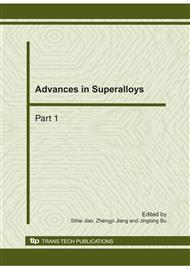p.1356
p.1361
p.1365
p.1369
p.1375
p.1379
p.1386
p.1390
p.1398
Effects of Anions on Corrosion Behavior of Ni-Cu-P Coatings
Abstract:
Ni-Cu-P coating was synthesized on copper substrate by electroless plating technique. The coating composition and corrosion resistance of Ni-Cu-P coating were characterized using energy-dispersive X-ray (EDX), electron probe micro-analyzer (EPMA), polarization curve (PC) and electrochemical impedance spectrum (EIS). The results show that the chemical nature of anions plays very important roles in the corrosion behavior of Ni-Cu-P coating. At a higher electrolyte concentration, Cl- and SO4 2- ions tend to promote the dissolution rate of Ni by their adsorption, while at lower electrolyte concentrations, NO3 - ions tend to dominate the dissolution rate of Ni-Cu-P coating.
Info:
Periodical:
Pages:
1375-1378
Citation:
Online since:
October 2010
Authors:
Price:
Сopyright:
© 2011 Trans Tech Publications Ltd. All Rights Reserved
Share:
Citation:


